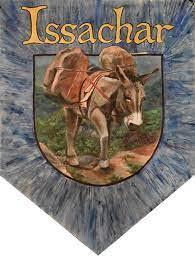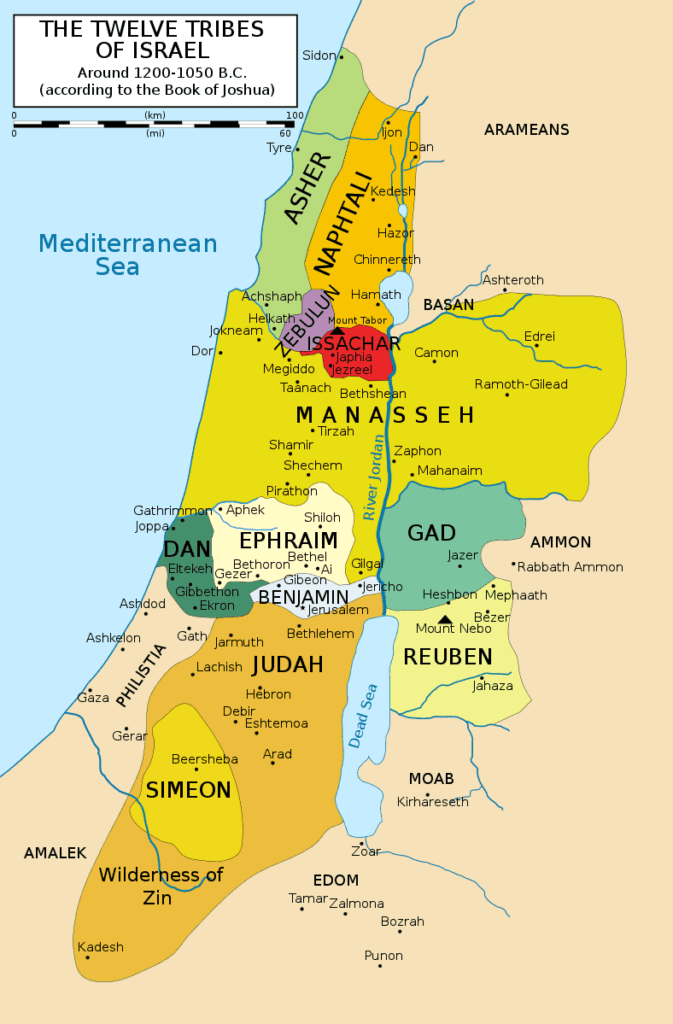The Tribe of Issachar
26: 23-25
The tribe of Issachar DIG: What does the Second Census tell us about Issachar’s historical roots? Why did the tribe of Issachar increase so greatly from the First Census? Why would the wilderness generation want to know they had common historical roots from their parents, but a separate identity from them?
REFLECT: What meaningful group (tribe) are you a member of? How does being a part of that group help to support you and make you grow spiritually? How does being a part of it enable you to help others? What can you do to make sure that the positive parts of your past are accentuated in your relationship with God?
Bear one another’s burdens,
in this way you will be fulfilling the Torah’s true meaning, which the Messiah upholds.

1. The First Census in the past found the tribe of Issachar being numbered at 54,400 (to see link click Ak – Numbering the Tribes). Jacob had prophesied: Issachar is a strong donkey pausing to rest between the sheepfolds, and [when] he saw how good [his] resting-place was, and that the land was pleasant he will [bend his shoulder to the burden], and will become a [farmer who tills the land] in Genesis 49:14-15. Issachar is pictured as a sturdy, hard-working donkey resting from his labors. When he sees how good his inheritance is and how productive the land may become, he becomes even more determined to continue his hard-working efforts (see the commentary on Genesis Li – Issachar is a Strong Donkey, and Became a Laborer Who Tills).

2. The Second Census in the present: The descendants of Issachar by their four clans, were: through Tola, the Tolaite clan; through Puah, the Puite clan; through Jashub, the Jashubite clan; and through Shimron, the Shimronite clan. These were the clans of Issachar, those numbered were 64,300 (26:23-25), an increase of 9,900 from the First Census (see Ai – The First Census: The Old Generation of Rebellion), or eighteen percent. Zebulun and Issachar are described as two tribes who will receive rich blessings from land and sea (see the commentary on Deuteronomy Ge – Rejoice Zebulun, in Your Going Out, Issachar, in Your Tents). Before going into the Promised Land, Moses prophesied: Rejoice, Zebulun, in your going out, and Issachar, in your tents. The two phrases going out, and in your tents, cover all of daily life, a merism (polar elements that signify a totality): going to work, coming home to rest. Moshe was blessing every aspect of their lives, what we might call the routine tasks of life.584 Peoples they call to the mountain – there they offer righteous sacrifices. For they suckle the abundance of the seas and the hidden treasures of the sand (Deut 33:18-19). This is a picture of worship followed by a communal feast, but the Jews had to bring their sacrifices to Mount Tabor (Joshua 19:12 and 22), and later the Temple, where they could enjoy family feasts. Issachar is seen as an obedient, contented, secure tribe, and the increase of their population revealed how much the LORD had blessed them.
3. The Messianic Kingdom in the future: Issachar will have one portion in the Messianic Kingdom; it will border the territory of Simeon from east to west (Ezeki’el 48:25). The lists of names and numbers are the material and tangible signs of God’s blessing, God’s faithfulness to past promises, and the surety of God’s future promise keeping (see Ae – Stars of Heaven, Grains of Sand, and the Promises of God). When Joshua led the Israelites into the Promised Land, Zebulun and Issachar had no outlet to the Mediterranean Sea. But during the Messianic Kingdom, they will have plenty of access to the sea because the topography of Isra’el will change at that time. The massive Millennial River, will begin at the Temple then flow down to the city of Jerusalem, where it splits, half heading east to the Dead Sea, and the other half heading west to the Mediterranean Sea (see the commentary on Isaiah Ge – Your Eyes Will See the King in His Beauty). Rivers will characterize the Millennial Jerusalem (Zechariah 14:8; Ezeki’el 47:1-12). Therefore, ships will sail on the Millennial River in the Kingdom. But while this is true, there will be no ships of war. No galley with oars will ride them, no mighty ship will sail them.585
The spirit of Issachar is still with us today. Rabbi Sha’ul, inspired by the Ruach Ha’Kodesh, speaks to us today and says: Brothers, suppose someone is caught doing something wrong. You who have the Spirit should set him right, but in a spirit of humility, keeping an eye on yourselves so that you won’t be tempted too. Bear one another’s burdens – in this way you will be fulfilling the Torah’s true meaning, which the Messiah upholds (Galatians 6:1-2 CJB). This reminds us of our own calling of being a burden bearer. A strong donkey for Yeshua, if you will. I wonder if Paul wasn’t thinking of the tribe of Issachar when he wrote these words. The spirit of Issachar is about restoration – about bearing burdens. That’s a picture of what ADONAI wants from us. We all need assistance from time to time. Which means God wants to use you as a burden bearer.
Dear Heavenly Father, Praise You for Your great steadfast love for me, at all times. You are right there to bear my burdens. For God Himself has said: I will never leave you or forsake you (Hebrews 13:5c). Your love and care is always surrounding me. When David was being chased by King Sha’ul, he still knew your steadfast love was there surrounding and protecting him. He said: O God, You are my God, earnestly I seek You. My soul thirsts for You. My flesh longs for You in a dry and weary land, where there is no water . . . Since Your lovingkindness is better than life, my lips will praise You. So I will bless You as long as I live. In Your Name I lift up my hands. My soul is satisfied with fat and oil, so my mouth praises You with joyful lips (Psalms 63:1, 3-5).
What a comfort to know that You are always there with me to care for me and bear my burdens. Cast all your worries on Him, for He cares for you (1 Peter 5:7). Problems and trials may seem to be so huge and out of control, but I can be comforted as I hold tightly to Your hand because I know that nothing can separate me from Your great love! For I am convinced that neither death nor life, nor angels nor principalities, nor things present nor things to come, nor powers, nor height nor depth, nor any other created thing will be able to separate us from the love of God that is in Messiah Yeshua our Lord (Rom 8:38-39). Praise You for Your Awesome love. I delight in loving You and living a life that says thanks to You, by loving You! In Messiah Yeshua’s holy Name and power of His resurrection. Amen



Leave A Comment